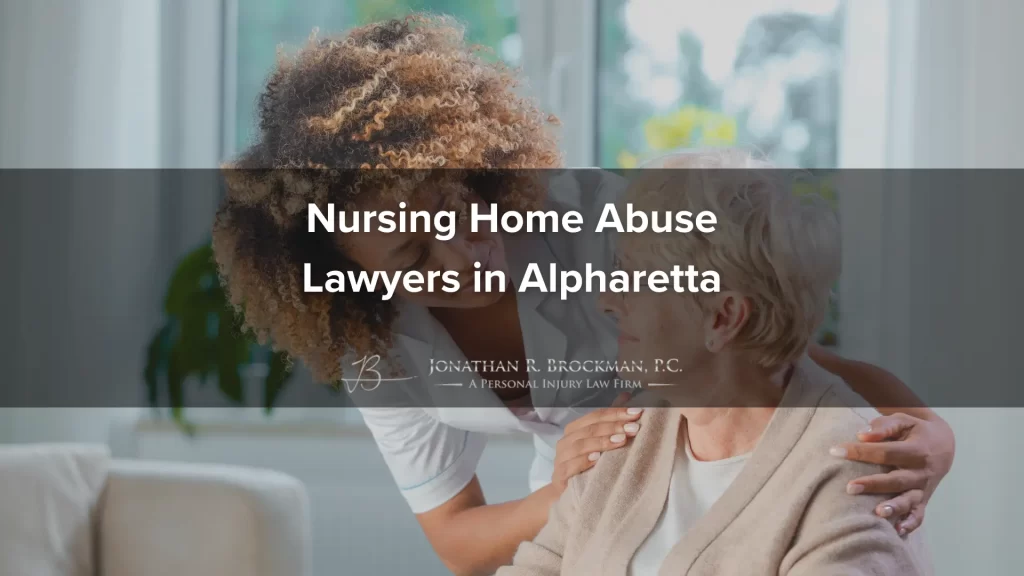
It’s a difficult choice to move your loved one into a nursing home. You do your research and find a nursing facility that appears to provide quality care and medical treatment. Placing them in another person’s care can feel stressful and overwhelming, however, and, unfortunately, sometimes that fear is justified.
Abuse occurs in nursing homes with alarming frequency. According to the World Health Organization, approximately one in six people aged 60 years and older have experienced some form of abuse in a community setting. You never expect your own loved one to be the victim of abuse, but when you suspect abuse is occurring, it’s important to seek help.
At Jonathan R. Brockman, P.C., our experienced Alpharetta nursing home abuse attorneys understand how devastating it is to learn someone you love suffered in an environment where they should have been safe. We will help you take steps to ensure your family member’s safety. Then, we’ll fight for the justice your loved one deserves and work hard to recover the maximum financial compensation available.
If your loved one was the victim of nursing home abuse, call us today at 770-205-8887 to find out more about our legal services and how we can help.
What Is Nursing Home Abuse?
Nursing home abuse occurs when an elderly resident of a nursing facility suffers some type of harm, whether emotional, physical, sexual, or financial. The staff members are supposed to create a safe environment for their patients and provide medical care when necessary. If they fail in their responsibilities, they could be held liable for the resulting injuries.
Five types of abuse could happen in nursing homes. Each has the potential to cause severe injuries or fatalities. There are warning signs you should look for if you believe your loved one experienced any type of abuse listed below.
Physical Abuse
Physical abuse is the use of physical force, which causes bodily injury or death. Punching, kicking, and any action that could lead to physical harm is abuse. Common signs that a nursing home resident is the victim of physical abuse include:
- Unexplained wounds, bruises, or burns
- Sprains
- Dislocated joints
- Broken bones
- Hair or tooth loss
- Consistent treatment of the same or similar injuries
- Fear of specific people in the nursing home
Emotional Abuse
Emotional abuse is the intentional cause of fear, pain, or distress. If you think your loved one is suffering from emotional abuse, it might be challenging to notice the warning signs. This form of abuse doesn’t typically lead to physical injuries. It only affects the victim emotionally or psychologically.
The symptoms that might indicate emotional abuse include the following:
- Withdrawal from activities, friends, or family
- Depression
- Mood swings
- Difficulty eating or sleeping
- Low self-esteem
- Avoiding eye contact with people
- Fear being left alone with certain individuals
Emotional abuse usually takes the form of these behaviors:
- Insults or name-calling
- Cursing
- Intimidation
- Isolation
- Terrorizing
- Humiliation
- Threatening
- Keeping the victim away from their personal belongings
Sexual Abuse
Sexual abuse occurs when one person uses physical force, coercion, threats, or other means to engage in sexual acts with another. Older adults in nursing homes are especially vulnerable to this type of abuse. If they have a mental or physical disability, they’re even more at risk.
Some warning signs that might indicate your loved one was the victim of sexual abuse include:
- Difficulty sitting or walking
- Social or emotional withdrawal
- Pain or bleeding from the genitals or anus
- Bloody, torn, or stained undergarments
- Development of a new STD
- Pelvic injuries
- Panic attacks
- Bruised inner thighs or genitals
- Depression
Financial Abuse
Financial abuse doesn’t occur as often as the other forms of abuse. Although rare, it’s something you should be aware of. Most often, staff members will take advantage of patients they know are in excellent financial standing. They might illegally gain access to bank accounts or make unauthorized ATM withdrawals.
Warning signs include:
- Unusual bank account activity, such as unexplained wire transfers or withdrawals
- New joint account or credit card set up in a person’s name that you don’t know
- Unpaid bills or discontinued utilities
- Bank and credit card statements mailed to the perpetrator’s home
- Checks written as a gift or loan to someone the family doesn’t know
- ATM withdrawals that your loved one couldn’t have made
- A staff member that shows interest in their patient’s finances
- A sudden and unexplained change in the resident’s power of attorney
- Missing cash, assets, and expensive items
Neglect
Neglect is the failure to meet someone’s needs or keep them safe. When a nursing home staff member doesn’t provide adequate care, your loved one could suffer the consequences. Neglect could take many forms and cause debilitating injuries to the victim. For example, a nurse who leaves an elderly resident alone in a wheelchair for hours is exhibiting neglect.
The most common warning signs include:
- Poor hygiene
- Malnourishment
- Bedsores
- Injuries that go untreated
- Dirty or disorganized bedroom
- Your loved one’s dirty or unkempt appearance
- Dehydration
Why Does Nursing Home Abuse Happen?
There are multiple reasons for nursing home abuse. They’re all preventable; however, many facilities don’t follow federal regulations set by the Nursing Home Reform Act. These regulations are supposed to protect nursing home residents’ rights and provide a guideline for staff.
Some of the most common reasons for abuse and neglect include:
Understaffing
If a nursing home doesn’t have enough nurses, assistants, and other staff members, the patients suffer. Staff can’t check on all their patients promptly or adequately diagnose a medical problem. They’re overworked, and that can lead to neglect. A patient who needs assistance walking to the bathroom might try to do it on their own if multiple requests go unanswered. They could fall and get seriously hurt as a result.
Understaffing can also result in elder abuse. Staff who feel frustrated with their long hours and minimal pay might take out their anger on the residents. That could lead to physical or emotional harm.
Inexperience
Unfortunately, nursing homes will cut costs by hiring nurses without properly vetting them. Instead of performing thorough background checks, they’ll hire any applicants that can fulfill schedule requirements. If staff members don’t have enough experience, they won’t know how to interact with patients or provide the right type of treatment for specific medical issues.
Management
Sometimes caregivers in nursing homes don’t perform their jobs well because of mismanagement or lack of management. There should be adequate supervision of all staff members to ensure everyone is following federal and state laws. Employees should also get access to training and education programs, so they’re able to perform all their job duties correctly. Lack of training and supervision can result in nurses who skip crucial steps or make mistakes while providing medical care.
Follow These Steps If Your Loved One Was Abused
If your loved one sustained injuries and you suspect it’s from nursing home abuse, you should take immediate action. You want to keep them safe and protect their rights to financial compensation. To ensure you’re able to hold the nursing home or specific staff member liable for their actions, follow each step below.
- Notify the nursing home. File an incident report and request a copy of it. If necessary, call the police and file a report with them.
- Ask for a copy of the facility’s liability insurance policy. You could potentially file an insurance claim for compensation of incurred expenses.
- Discuss the circumstances of your loved one’s abuse with them in private. If you do it with other people around, they might fear exposing their abuser.
- Remove your loved one from the nursing home and get them admitted to a hospital to treat their injuries. Once they recover, transfer them to a safe facility.
- Keep all documentation associated with the abuse. Things like medical records, billing statements, imaging reports, prescriptions, and physician letters can help prove what happened.
- Hire an Alpharetta nursing home abuse lawyer. You’ll need help filing a lawsuit and gathering all the evidence necessary to recover the maximum compensation available.
Is There a Deadline to File a Lawsuit?
 If you want to sue the nursing home or specific individual who abused your loved one, you’ll need to follow the state’s statute of limitations. The statute of limitations in Georgia is two years. That means you have two years from the date of the abuse to pursue legal action. If two years pass, you’ll lose your right to compensation for this matter.
If you want to sue the nursing home or specific individual who abused your loved one, you’ll need to follow the state’s statute of limitations. The statute of limitations in Georgia is two years. That means you have two years from the date of the abuse to pursue legal action. If two years pass, you’ll lose your right to compensation for this matter.
Under particular circumstances, you could push back the deadline for filing a lawsuit.
- The clock will start when you discovered the injury as opposed to the date it actually happened. This is known as the discovery rule.
- If there’s a criminal case pending for the nursing home abuse, the clock won’t start until it gets resolved.
Speak to Our Dedicated Alpharetta Nursing Home Abuse Lawyers
At Jonathan R. Brockman, P.C., we understand how you’re feeling. This has been a traumatic experience for your loved one, and you want the person responsible for the abuse to pay for their actions. When you hire us, we’ll fight hard for justice and pursue the maximum monetary award available.
We care about our clients. You’ll never feel ignored or abandoned while we’re working on your case. We’ll maintain open communication and provide frequent status updates. Our legal team will provide services you can depend on.
We work on contingency, so you won’t have to pay us up front to represent you. We don’t expect payment unless we secure an insurance settlement or reach a favorable jury verdict. If we don’t win your case, you won’t owe us anything.
If your loved one suffered injuries in a nursing home and you want to pursue legal action against the negligent party, call us at 770-205-8887. We’ll schedule a free consultation with one of our Alpharetta nursing home abuse lawyers.
